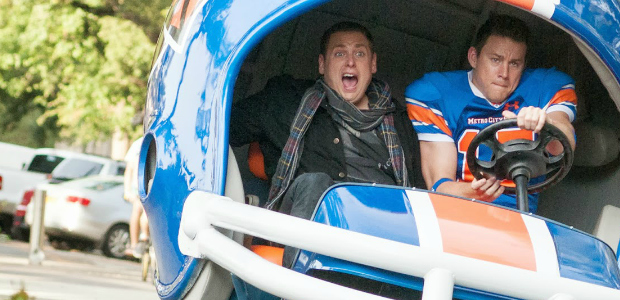There are dual sensibilities at war in the mildly diverting 22 Jump Street. The first, and most obviously prominent one, are the pressures of making a sequel. You can't zag where the first film zigged, lest you disappoint fans who assume they know what they're going to get. If gags worked the first time, they should re-appear, at least in a modified manner to produce an artificial sense of surprise. The whole gang should be back, and their chemistry should carry over. Don't mess with success.
The other sensibility is the satirical one from directors Phil Lord and Chris Miller, who openly acknowledge and mock that first sensibility each chance they get. Several running gags in the first film gently poked fun at the conventions of remaking a not-well-remembered television show into a big screen comedy, while also pushing the noted homoeroticism and gratuitous violence at the heart of most heavily-masculine action pictures. Here, their target is franchises themselves, as they lay waste to the expectations of a follow-up.
22 Jump Street film is bigger and it freely admits it, repetitive and boastful of the fact, and ultimately completely unnecessary. Lord and Miller have fun with that last insight, but it definitely feels like the act of two gentle mischief makers let loose on a Hollywood soundstage: any sort of incisive commentary gets buried by the necessity of formula.
In 21 Jump Street, the picture seemed to wrap with Schmidt and Jenko trading places. Schlumpy Schmidt (Jonah Hill) became the “popular” one, making friends and getting the girl, and studly Jenko (Channing Tatum) was lost at sea until developing a new range of nerdy interests to better define himself. The plot now takes this duo to college, to launch an undercover drug operation similar to the one that took them to high school in 21 Jump Street, and as a result, the dynamic is switched. Now Schmidt is the loner, ignored at parties and mocked for his lack of athletic prowess, and Jenko has returned to the top of the social food chain. Unfortunately, for this to happen, the growth shown by these characters in the first picture has been undone. Schmidt is still quick to shy from physical activity, and his relationship with Jenko is as needy as ever. Jenko, adorably dim but sweet and intuitive in the first film, now just seems like a standard-issue dummy.
The drug they are tracking is something called Why-Fy, and the investigation feels like it moves as slow as need be to allow for the characters and actors to play off each other, to the point where Jenko and Schmidt openly ignore obvious clues that would shorten the film considerably. Instead, Jenko falls into hetero-love with a fellow frat brother played by the sinister-looking Wyatt Russell (Kurt's son, all chin), and the two of them guilelessly compare pecs and drink all night, even though this guy definitely seems like a potential suspect. Schmidt, meanwhile, falls for a coed played by the gorgeous Amber Stevens, who otherwise doesn't have nearly as much to do as the first film's love interest, Brie Larson. Larson's cut-the-bullshit casualness provided a brief respite from the testosterone-heavy theatrics, but here Stevens takes a back seat to repeated sequences of Schmidt and Jenko having “couples fights” where they address their friendship through the use of oblivious but excessive double entendres. While there are some laughs that come from Jenko's sudden collegiate affection for gender studies, the film also stops short for an excessively ugly joke about how the first film's Mr. Walters (Rob Riggle) has coerced cellmate Eric (Dave Franco) into a sexually abusive relationship against his will.
You don't need to guess that Lord and Miller come from the world of animation, as many sequences feel like MAD Magazine brought to life. Miller and Lord lack the framing skills to make their absurdist jabs land, so these feel like botched opportunities: one joke invents the visual of an entire campus performing the “Walk Of Shame” but each time the lens stays fixed on Hill, neglecting the comic possibilities of a student body made up entirely of regretful hookups. Another moment finds a chase sequences slowed to allow for a “Yakety Sax”-soundalike playing over a building named after a “Benjamin Hill,” which feels more MacFarlane than Looney Tunes.
Instead, a significant amount of time is spent with characters improv-ing back-and-forth to diminished returns, to the point where entire chunks of this film feel stitched up with outtakes. Schmidt and Jenko end up at one slam poetry performance for very slim plot reasons-- a scene that ends with Hill performing a rhyme off the top of his head, a gag that only underscores the film's weirdly belligerent attitude towards art students.
The campus of the film never feels like the elaborate ecosystem of high school from part one, but maybe that's the point, in that it's a place much more difficult to navigate socially, allowing for added tension. It also allows for a few smart casting decisions, like the Lucas Bros., a comedy duo that play laid-back dorm twins Keith and Kenny Yang. And while it's something of a sausage fest, many scenes are stolen by a young comedienne named Jillian Belle, who plays Stevens' pushy roommate and who immediately calls the aged-looking Schmidt on being a narc. She has one late scene, maybe the best scene in the movie, that absolutely skewers Hollywood's conflicting views on sex and violence. Her character also has zero tolerance for Schmidt and Jenko's tomfoolery, and the way her character is introduced into scenes feels like its own record scratch, sarcastically mocking these boy cops who essentially are playing dress-up.
Along with a somewhat-brilliant closing credits gag that won't be spoiled here, but which actively mocks franchise-building, Belle's harsh dismissals feel as if somehow Lord and Miller know that they're wasting their considerable talents on a flimsy premise that has exhausted its own well of jokes.











